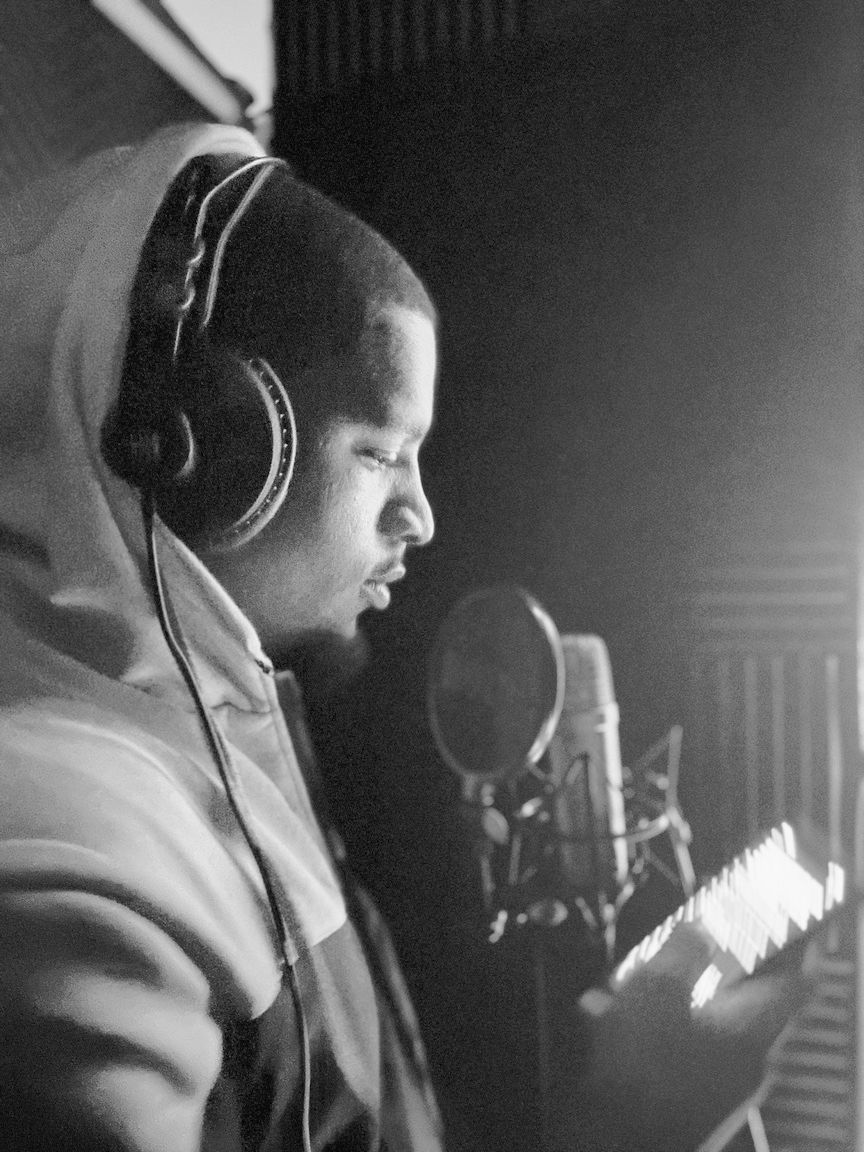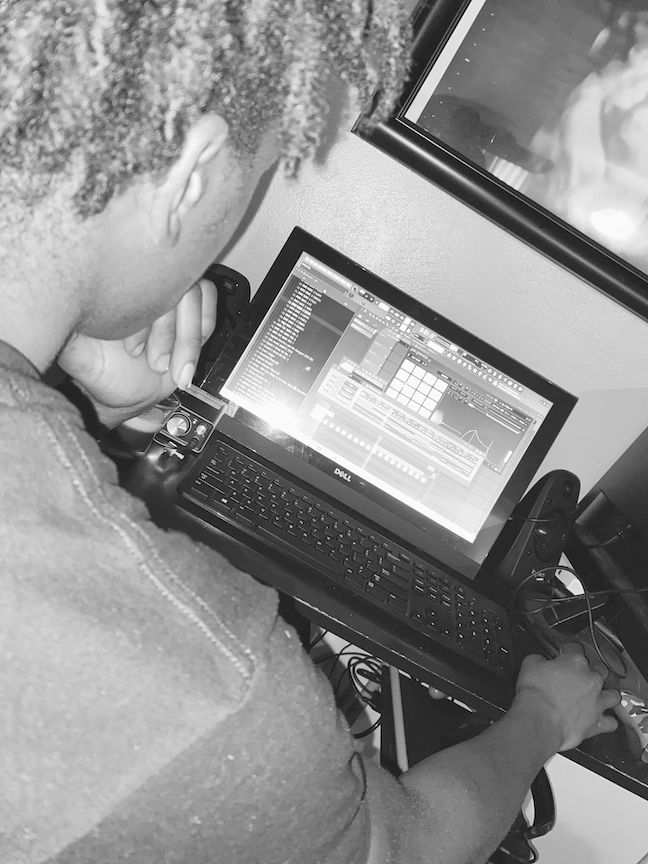Living Outside the Presets A conversation with Zaire Fields and Khalil Nasir
by Cristian Andersson
Within ten minutes of meeting Zaire Fields and Khalil Nasir, Zaire related a personal story that made a few things extremely clear: that this conversation would be made up of equal amounts of trust, humility and integrity, and how they view the work they are doing brings a restorative quality to both self and community. While I was able to hear that story upfront in our conversation, I will relate it later to you.
This interview with Zaire and Khalil came about through Kristen Gondek, a strong social justice voice in the community who has been immeasurably helpful in connecting people. Kristen was aware that we wanted to raise up the diverse voices in our community with fsm., and Zaire and Khalil were looking for ways to gain exposure for they were doing with youth and music. This was a perfect fit. Zaire, Khalil and I masked up, started the recorder, and talked for nearly an hour and a half.

The mission that these two guys are on is an admirable one. Through their knowledge of music, they are offering youth the experience of working lyrics and beats to find self-expression and empowerment. As Zaire says “When working with these kids, you can hear the things they want to get off their mind. You can hear the things in their heart. You can hear what they go to sleep thinking about at night. And, it is not just that kid feeling that way. Thousands, millions, of kids feel that way.” It should be no surprise to anyone that the mixed emotions that we all have faced in our younger years have been exacerbated in contemporary times. Zaire continues: “If you want to voice your pain through trap music, R&B, soul, old-school, anything...[we’re] going to give you the opportunity to do that. There is something about coming into an atmosphere, just to be heard. That’s a feeling that you can’t get rid of.”
We talked about necessity to give the youth the freedom to express what is on their minds. Often there is an assumption that younger people cannot handle an experience or have the capability to process some of the larger issues in life. And, while it is true that they may not have developed the critical thinking that we hopefully have as an adult, they are absolutely aware of what is going on, and need to find ways to talk about it. “[We’re] not going to put a cap on it and be like, ‘no, no, we’re not going to make that music,’” Zaire explained. “[We] will open up that door for you and will let you do that. We will help you critique it and engineer it. Basically, when you walk through the doors of the recording studio, [we] want these kids to know that the very moment you walk in, we’re going to support you.” And these kids come in with years of words, written out in notebooks, just waiting to have a constructive way to be shared.
I asked the guys if anyone has shown interest in learning the technical side, the production side, of what they were doing. Khalil, who has a level of magic and artistry in the way he produces beats and handles the production side spoke up. “For me, everything was self-taught. From music theory to how to work the computer programs. How to express the music. How to bring it out. I do love teaching, and the way I like to do that is for them to experience a hands-on approach. And having someone show interest in what I do? You know, I used to think that it was nothing. It was just something that I just did, because I liked to. But to see that it sparks interest in someone? [That is] a grateful feeling.”

Zaire and Khalilwent into some details about the construction of beats, and how Zaire will challenge Khalil in ways to create them, which he easily accepts and succeeds at. As we talked about beats, the underlying structure to songs, some incredible conversation came up. Zaire made this statement thinking about how we casually relate to the music we hear: “Was it the beat or was it the lyrics? Because you can be inside of Walmart–and they play random songs all the time. You hear so much chatter. So, you’re not going to be able to hear what the song is saying, but you’re going to hear that beat. You will be strolling down the aisle, you know, grabbing your peanut butter, and you may not hear the lyrics. The lyrics are basically that open doorway for you to express yourself. It’s what you can say over the sound of the beat. That’s what’s going to actually touch someone. Music controls in a lot of different ways. There is music that makes me want to scream, yell, fight, dance, or all types of different things. It’s always going to be the sound of the beat, and the frequency waves, that’s going to make me want to get up and express myself, you know?” Khalil then added in some abstracted thoughts. Khailel spoke about beats as “impacts.” A kick drum, a snare, a cymbal–they are just ways of creating a beat, a pattern, an impact. But, he went on, so is the way you stomp your foot. Snap your fingers. Crumple paper. Hear the rain. Those are also impacts, but relate to us in an everyday fashion. “They are more, for lack of a better term, human,” Khalil said. I internalized what Khailel said and thought about how the individual noises we make in life are representative of ourselves as an individual. They are our own personal songs. This brought me back to something Katharina Abderholden, choreographer, dancer and co-creator of fsm. said about movement. “Any movement is a way of dancing. Just the act of walking across the stage. The way we walk is also reflective of our individuality–we all walk differently because of our experiences.”
Bringing this back to how they work with the young community, I asked if they were teaching them about music, or if they are teaching them about something else?
Zaire: Make music, but...
Khalil: Make music, but more than anything, express yourself.
Zaire: When they come to us, I want them to learn a few things. Trust, safety. Understanding, respect, value, and cherishing every moment that you are even be here to record music. Because either you could be here recording something, or are you going to be on the streets, doing something you have no business doing? That’s who I was. I was the kid that was on the street, doing things I had no business doing, but, you know, I never had anybody who would sit here and be like, look, you’re a talented young man. Let me invest into that. Let me invest today. [Speaking about making music] It’s not about, oh, let me get you under contract, or stuff like that. It’s let me help you build a reason to wake up every day and look forward to something. And if that means coming here every day to record a new song, or to practice, or whatever the case may be, do that. Because in that case nobody can ever say: “oh, well, this man was here at this time.” “That’s not true. I was here doing this, you know, something for myself.” My number one thing that I’ll always tell [the kids] when I first met them, is that you have to live life for yourself before you live it for someone else. You have to, because no matter how many opportunities people give you, it’s all about what you’re going to do with it. Set the stakes high for yourself, so when you’ve walked in that door and you want to record music, take that opportunity right there to invest into a better future for yourself. And when you invest into the better future for yourself, you take that, and you shape your life. Then you have full control of what you can and can’t do with your life. You also have full control of being able to say: I did this when I was young. I found my purpose at a young age, and it was through music.
Khalil: My mother used to tell me when I was younger–it’s funny now thinking about it because I was confused back then–but she was like: “beat the best. Be the best and then beat yourself.” So, if you’re constantly focused on the best one, and then take that as a challenge to be that best one...that’s where a lot of people get comfortable. But the best thing is to constantly beat that. See if you can outdo yourself, because you can outdo yourself every day. There’s nothing that you can’t do. Life is full of opportunity to take it, just like [Zaire] said, but at the same time there’s more than one way to express yourself. Don’t let nobody tell you what you can’t do, because you only can do it if you believe that you can. Honestly. There were a bunch of things I was told: “You can’t do this, you can’t make that. You can’t be there. And there was a few that I believed and then others that I didn’t. The ones that I believed were the ones that actually came true. You are what you think you are, what you feel yourself to be. So like, if you are convinced, you are that. If you think less than, you are that. You are what you think.
This brings me back to that story that Zaire related to me, according to the recorder, one minute and nine seconds into our conversation. Zaire told me about a close friend of his. Best friend. Zaire was being the producer, making the beats, for his friends’ music. This friend was going through a lot of pain. A level that caused that person to take their own life, and Zaire told me that it haunts him to this day. He never wanted to get back into the music industry. Never wanted to make a beat. Never wanted to rap or sing–until he met Khalil. Through their partnership, a healing occurred. They built a little recording studio in their apartment complex: putting up soundproofing and investing in a good microphone and computer set-up. Music started being made again. It was from there that these two found opportunity, not just for themselves, but for younger generations to grow through. Zaire talks about these kids writing music and poems,but maybe didn’t have a way to get into a studio. He thought that if this is a way to get kids off the streets, or out of their homes, they could get into an area where they could feel good and be heard.
I asked them if they had ever worked with someone like the Boys & Girls Club. Or find a way to partner up with what they are doing and get some more exposure. They were adamant that they are not looking for a hand-out, but the idea of creating a partnership is certainly something worth considering. The youth need a way to express themselves, and this is especially true in families that may not have access to the same opportunities, whether it is because of financial resources; racial, gender, or religious prejudice; or the misunderstanding that they may not be welcome. What Zaire and Khalil are wanting to do is remarkable, and something that ourcommunity needs to invest in. Let’s find a way to make this happen. While they know that they need to make money at this, to keep it going, they are generously offering a first session for free. With one less barrier to entry, these kids have an chance to learn something new and have an chance to build something new in themselves. “I just want to give them the opportunity and the ability.” Zaire continues, “I don’t want to be your father, I don’t want to be your mother. I just want to be someone who opened up that door for you. To express yourself in life.
There is always the thought about who should be the perfect role model. When I was young, I heard a quote that went something like: if you are going to have a role model, make sure they are dead. Because then they can’t screw it up. Of course, as we are all aware of, even death doesn’t preclude the ability for someone to mess up your idealism. Khalil offers an alternative: “who is your hero? Me. Me in ten years. And then, ten years later.” The work that these two guys are doing is going to help a lot of kids figure out that the hero they need in their life, is themselves.
is endeavor.



